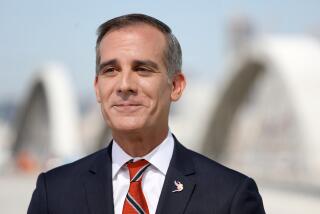Bush Reaffirms Support of Nominee for CIA Post : Iran-Contra: The President says he sees nothing in latest disclosures to implicate Robert Gates, but some senators are not so certain.
WASHINGTON — President Bush strongly defended his choice of Robert M. Gates to be director of the Central Intelligence Agency on Wednesday as indications began to mount that the nomination could be imperiled by new revelations about the Iran-Contra scandal.
Hearings to confirm Gates, who was the CIA’s second-ranking official when the scandal came to light during the Ronald Reagan Administration in 1986, had been tentatively scheduled to begin on Monday. But sources close to the Senate Intelligence Committee said that several senators have indicated that they want to postpone the hearings because of the latest disclosures.
The new information, made public Tuesday, cast fresh doubts on Reagan Administration assertions that only three White House aides were involved in the illegal diversion of profits from the sale of arms to Iran to aid the Contras in Nicaragua.
Reaffirming his support for Gates, Bush told reporters that he saw nothing in the new disclosures to implicate the 47-year-old career intelligence officer “in something that was not right.” He added that he had talked with Gates “only this morning to say: ‘Hey, you’re my man. I’m all for you.’ ”
But Bush’s faith in Gates clearly is not universally shared on Capitol Hill. Some senators said that the nomination will be examined much more closely after Tuesday’s admission by Alan D. Fiers, the former head of the CIA’s Central American task force, that he and at least three other senior CIA officers were aware of the diversion before it became public.
Gates, whose role in the scandal was examined four years ago when he was first nominated to head the CIA, told Congress in 1987 that he did not learn of the diversion of funds until it was announced by then Atty. Gen. Edwin Meese III on Nov. 25, 1986. He failed to dispel congressional doubts, however, and withdrew his nomination shortly after the hearings began, saying that he did not want to cause further controversy.
When Bush renominated Gates last month to succeed outgoing director William H. Webster, Administration officials expressed confidence that the Iran-Contra scandal was behind them and predicted that this time Gates would be swiftly confirmed.
But Fiers’ admission in federal court that he and other CIA officials misled Congress when they testified about the Iran-Contra scandal in 1987 has revived doubts about Gates and unsettled even his staunchest supporters on the Intelligence Committee.
“It deeply shocked everybody,” said an aide to a Republican member of the committee. “A lot of people are now talking about delaying the hearings. They’re afraid that what would have been a contentious hearing is now going to turn into a bloody one.”
The committee met behind closed doors Wednesday afternoon, but reached no decision about a hearing date. Chairman David L. Boren (D-Okla.) said afterward that he wants to consult with several absent members before announcing a decision today.
Boren and several committee members who support Gates indicated that they may wait to see what additional disclosures arise from the Fiers case before proceeding with the hearings. “We’re reviewing the whole situation, and, obviously, we have to look at everything, including the Fiers case, before taking a decision,” Boren said.
“A lot of people are now talking about a delay,” one committee source said. “They want to see what happens with Fiers. . . . Even people who support Gates are terrified now of making a mistake.”
Sen. Frank H. Murkowski of Alaska, the committee’s ranking Republican member, said that in the absence of hard evidence linking Gates to the Iran-Contra scandal, it is premature to suggest that the nomination is in serious trouble. “The bottom line is there is nothing yet to implicate Gates,” he said.
Fiers pleaded guilty Tuesday to two misdemeanor charges in a plea-bargain agreement with Iran-Contra prosecutors. The former CIA official said that at least three other senior officials besides himself and the late CIA Director William J. Casey knew about the diversion months before it was disclosed by Meese’s office. Fiers identified those officials as Clair George, Gates’ immediate deputy, and two other officials whose names were not disclosed because they are still serving with the agency.
“The question now is who else might have known,” a senior committee source said.
Staff writer Ronald J. Ostrow contributed to this story.
More to Read
Get the L.A. Times Politics newsletter
Deeply reported insights into legislation, politics and policy from Sacramento, Washington and beyond. In your inbox three times per week.
You may occasionally receive promotional content from the Los Angeles Times.










